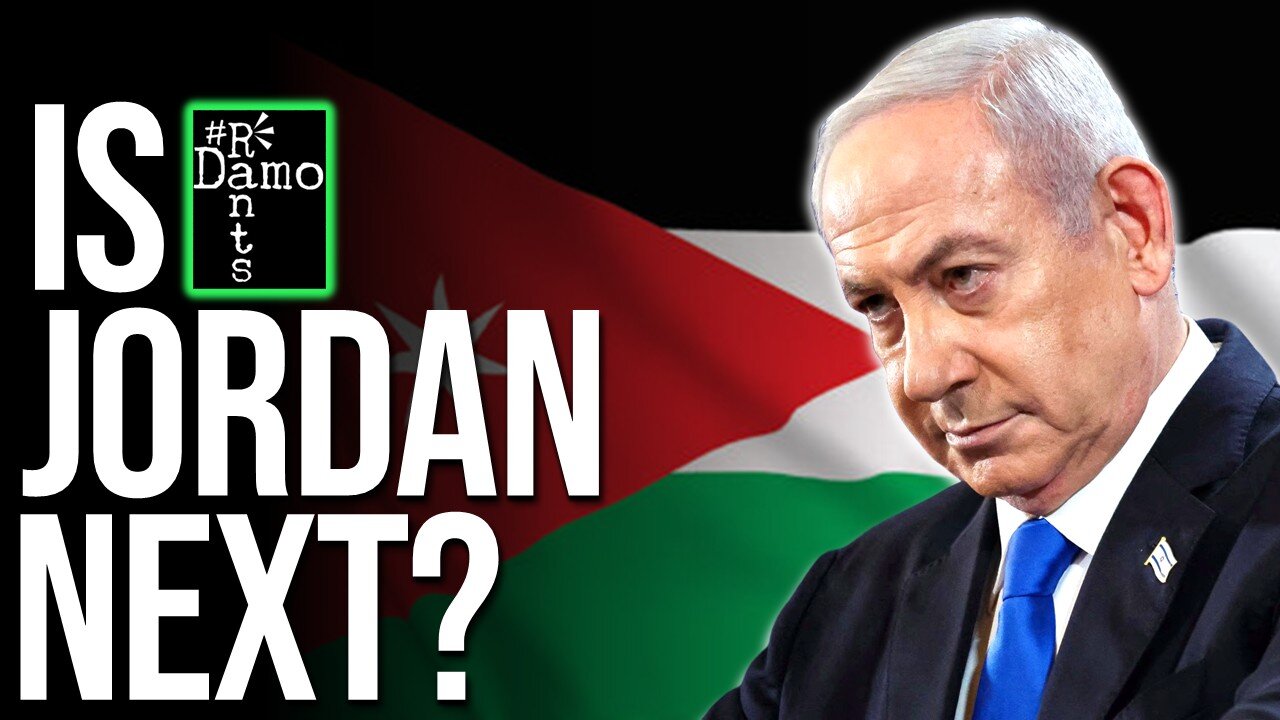Premium Only Content

Jordan Was Ordered to Show Loyalty — Now It’s Desperate to Break Free
Right, so Jordan have just announced the reintroduction of compulsory national service for the first time since 1991. Officially, it was framed as a project of “discipline, youth development, and national identity.” In reality, it was an unmistakable signal of fear. Just days earlier of course, Benjamin Netanyahu had gone on television to endorse a vision of “Greater Israel” that erases Palestine altogether and, by implication, puts Jordan’s sovereignty on the chopping block. Jordan is completely gone under this plan you see.
Six thousand young men will be drafted for three months beginning in 2026. They will be denied phones, paid a modest stipend, and threatened with penalties if they refuse to comply. To the Jordanian monarchy, these measures are a show of resolve. To outside observers though, they are a symptom of desperation and perhaps of chickens coming home to roost.
Jordan has bent. And broken. But it has not been spared.
For decades, the kingdom has signed humiliating treaties, imported Israeli gas, coordinated with Mossad, and even crushed its own citizens’ solidarity with Palestine. Its leaders believed that appeasement bought survival. Now, after the destruction of Gaza and the annexation of the West Bank, Netanyahu has revived the century-old claim that “Jordan is Palestine.” The kingdom’s reward for decades of loyalty is to be cast as the next Palestine.
So while the question is very much being asked about whether Palestine can survive under relentless Israeli assault and global inaction. Jordan appear to be asking themselves whether they will.
Right so Jordanian assistance and acquiescence to Israel has disgusted and enraged many, so for as much as the idea of Greater Israel also enrages people, there’s a few who might be considering this karma for the kingdom too, but if you’re of a mind to not care, we need to, because its proof that even with the end of Palestine as we know it, Netanyahu will not stop there. He will always need another war to keep himself in power and out of the courtroom. To understand Jordan’s predicament though, lets first look at the collapse of the Palestinian national project west of the river. The so-called two-state solution has long been described as an illusion and rightly so, Israel would never permit such a thing and are actively annihilating the idea now, its less an illusion in 2025 as it is a corpse, already dead and buried. In the West Bank, Israel has entrenched its settlement project to the point that Palestinian territorial continuity has basically been ended, Israel have legislated it so, but when the de facto governor of the area is Bezalel Smotrich what chance did they have? Settlement blocs, military zones, and bypass roads have left Palestinian enclaves fragmented and surrounded. The Palestinian Authority functions less as a sovereign body and more as a subcontractor of occupation, dependent on Israeli goodwill for survival and doing their dirty work when required. De facto annexation has become open absorption, the West Bank now about to be split in two by Israeli expansion if illegal settlements accompanied by legislative and judicial moves in Israel to formalise the new reality over land that is not theirs, yet have been allowed to illegally occupy for well over 50 years.
In Gaza, the devastation has been even more stark. Israel’s war has left vast swathes of the Strip uninhabitable, destroyed hospitals, schools and farmland, and deliberately engineered famine conditions. United Nations agencies, humanitarian organisations, and even Israeli human rights groups have described the situation exactly as it is – a genocide, yet still the inaction on governmental parts makes you sick. Starvation is no longer incidental but a weapon of war, and displacement appears not to be temporary but a permanent re-engineering of demographics. You only need to look at Gaza City right now to see the drive to displace half of Gaza’s entire population now to see that.
For Jordan, this erasure of Palestine, happening on their doorstep as they stood by, as they looked on, as they let their airspace be used to stop Iranian missiles and drones and the like, isn’t just alarming, but an existential warning. In the minds of Zionist extremists, the demise of Palestinian statehood west of the river naturally points to Jordan as the solution to the “Palestinian problem.” The notion that “Jordan is Palestine” has been present in Revisionist Zionism since the early twentieth century, voiced by figures such as Ze’ev Jabotinsky and later embraced by Israeli Prime Ministers from Menachem Begin and Ariel Sharon to Netanyahu himself. Netanyahu, whose political lineage is steeped in this tradition, has resurrected the claim at a moment when Israel has achieved decisive control over Gaza and the West Bank, seemingly unopposed, too much hand wringing going on, not enough action. The implication is brutally simple: if Palestinians cannot exist in their historic lands west of the Jordan, they can be displaced into the kingdom to the east. Jordan therefore finds itself not merely a neighbour of a genocidal apatheid state but cast as the next territorial and demographic target.
Netanyahu’s televised embrace of “Greater Israel” earlier this month was not a casual remark but a deliberate provocation. For Jordan, it was a direct threat. The Ministry of Foreign Affairs condemned the comments as a violation of international law and a danger to Jordanian sovereignty. Parliamentary blocs described them as colonial and expansionist. Analysts in Amman noted that this was the articulation of a long-standing ideological commitment to expansion. Prime Minister Dr Jaafar Hassan sought to calm the public by dismissing the remarks as an “illusion,” but the monarchy, King Abdullah, was clearly shaken. Within days, the decision to reintroduce national service was announced therefore. The New Arab amongst other outlets linked the two developments, noting that the timing was too close to be coincidental.
Reintroducing conscription is both a symbolic and practical act. On the surface, it was framed as a project of youth discipline, a national project to build responsibility and loyalty. In reality, it was an admission of vulnerability and a warning signal. For the Jordanian public, it suggested that the state recognised the gravity of the threat. For Israel, it was meant to show that Jordan would not be an entirely passive victim. Yet the scale of the programme—three months of training for 6,000 men in the first year—underscored its limits. This was not preparation for deterrence but a gesture of mobilisation, a sign that the monarchy was rattled by the spectre of annexationist rhetoric turning into policy.
Why is Jordan so vulnerable? Some of that lies in the history of its long accommodation with Israel. Since the 1994 Wadi Araba Treaty, Jordan has sought to normalise relations with israel, hoping to secure its borders and its monarchy. It has engaged in intelligence sharing, joint security coordination, and economic integration. It has imported Israeli gas despite public opposition, purchased water, and facilitated infrastructure schemes that bound its economy to Israel. Diplomatically, it has often softened Arab League statements to avoid isolating Israel.
At home, the monarchy has also policed its own population to avoid embarrassing its treaty partner. Jordan’s majority of Palestinian origin – so many of its citizens are descendants of the Nakba of 1948 - has consistently shown solidarity with the Palestinian cause, but protests have been met with batons, tear gas, and arrests. Amnesty International documented waves of repression after October 2023, with thousands detained over the course of a year. By last month, the scale reached historic levels: hundreds of activists, politicians, and even a seventy-two-year-old former mayor were arrested in what was described as the largest crackdown since the political crisis of 1989. Detainees reported beatings and abuse. One young man died in custody after being subject to a "severe physical assault" during detention.
The case of activist Ayman Aballi illustrates the cynicism too. Aballi posted videos urging the government and public to act against Gaza’s starvation. For this, he was detained for a week and charged under the 2023 Cybercrime Law with publishing material deemed harmful to social harmony. The law, with its vague prohibitions, has become a weapon to criminalise dissent, particularly expressions of solidarity with Palestine. By policing speech and protest so aggressively, Jordan has demonstrated to Israel and its Gulf patrons that it is willing to suppress its own people in exchange for aid and goodwill.
Yet this accommodation has bought no safety. Israel does not see Jordan as a partner but as pliant, weak, and ultimately disposable. The very fact that Jordan has repressed its own citizens for Israel’s sake proves, in the eyes of expansionists, that it can be pushed further. Accommodation, rather than securing sovereignty, has marked Jordan as the path of least resistance and you kinda get the impression they know it too.
The repression last month also revealed external influences. Reports from Middle East Eye indicated that Saudi Arabia and the United Arab Emirates encouraged Jordan to crack down, offering financial support in exchange. Detainees alleged Israeli pressure as well. Jordan’s domestic authoritarianism was thus entangled with regional geopolitics: the monarchy was policing its people not only for its own survival but to reassure foreign patrons. This underscores the fragility of Jordanian sovereignty. The state is not acting independently but as a client, beholden to aid flows and diplomatic leverage. What exactly is King Abdullah king of? You might well ask in which case.
This fragility is compounded by Jordan’s internal contradictions. The monarchy claims custodianship of Jerusalem’s holy sites and presents itself as a defender of Palestinian rights. Yet it arrests its citizens for chanting in solidarity with Gaza. It presents itself as a bulwark of regional stability, yet it uses repression to silence the very voices that might give it popular legitimacy. This hypocrisy erodes trust and leaves the state brittle. When external shocks come, a regime that relies on suppression rather than legitimacy will struggle to mobilise society for genuine defence.
Jordan’s vulnerability is not confined to its western frontier with Israel though. To the north lies Syria, still fractured by years of civil war and Jordan has found itself engaging with Ahmed al-Sharaa, formerly known as Abu Mohammed al-Jolani, the one-time leader of al-Qaeda’s affiliate in Syria, Hayat Tahrir al-Sham or HTS. Al-Jolani has rebranded himself as a statesman, presenting HTS as a governing authority and seeking to normalise relations with regional states.
Talks between Amman and Damascus have focused on reconstruction, border security, and, crucially, water. Jordan and Syria share the Yarmouk River and the Al-Wehda Dam. The dam provides approximately forty percent of Jordan’s freshwater. For one of the most water-stressed countries in the world, already burdened by over a million Syrian refugees, this is existential. Agreements have been reached on fairer distribution, monitoring illegal wells, and exploring cloud-seeding techniques.
Yet Jordan’s dependence on Syria is precarious. Al-Jolani has given interviews insisting that Syria will not be used to launch attacks on Israel, clearly signalling a desire to win Israeli tolerance. For Amman, this is deeply troubling. The same man with whom Jordan must negotiate water and border stability may pivot to align with Israel even more than them. The kingdom’s survival is therefore partly contingent on deals with a former al-Qaeda leader whose loyalties remain very very fluid.
The situation is further complicated by Israel’s actions in southwestern Syria. Media continue to report Israeli incursions near the Al-Wehda Dam, creating fears that Jordan’s water supply could be strangled at will, but then, this part of Syria is of course also on the Greater Israel map. Analysts at the Quincy Institute described this as an existential threat, pointing out that Jordan’s survival depends on flows controlled by powers beyond its control. Whether or not Israel physically controls the dam, the perception of vulnerability is itself destabilising.
Taken together, Jordan’s vulnerabilities form a daunting picture. To the west, Israel has erased Palestine and may seek to displace Palestinians eastward. To the north, Jordan depends on a fractured Syrian regime and an untrustworthy al-Jolani for water and border security. Internally, the monarchy undermines its own legitimacy by repressing solidarity with Palestine. Externally, it is beholden to Gulf aid and U.S. military guarantees.
The reinstatement of national service is symptomatic of this condition. Officially about youth development, it is in truth an expression of fear. It is meant to signal readiness, but it betrays weakness. A conscription scheme of three months for a few thousand recruits cannot defend a kingdom of ten million from the designs of a regional superpower. It can, however, demonstrate that the monarchy recognises its vulnerability and is trying, however inadequately, to prepare.
If Israel were to target Jordan, what form would it take? The most likely scenario is not a conventional invasion but indirect coercion. One possibility is mass expulsion: Palestinians in the West Bank pushed across the river, creating a demographic and political crisis for Jordan. Another is water coercion, with Israel restricting flows from shared rivers and the Yarmouk Basin in Syria to pressure Amman. A third is border provocation, manufacturing security crises that destabilise the kingdom.
Israel would undoubtedly seek to justify such actions. It might claim that Jordan cannot control militant infiltration or smuggling, presenting itself as acting in self-defence. That usually works for them doesn’t it? It might allege Iranian proxy activity, recycling its rhetoric from Syria and Iraq. It might describe Jordan as a failed state, collapsing under refugee pressures, thereby legitimising intervention. Or it might openly assert that Jordan is Palestine, declaring the Palestinian question resolved by displacement.
Yet these narratives would collapse under scrutiny. Jordan has been one of Israel’s most reliable security partners since 1994. Its General Intelligence Directorate has suppressed militants ruthlessly. The US has troops stationed in Jordan and conducts joint exercises annually. To describe Jordan as an uncontrollable terrorist haven would be implausible. The claim that it is a failed state would ring hollow, as Jordan still possesses functioning institutions. And the argument that “Jordan is Palestine” would confirm the charge of ethnic cleansing that already dogs Israel after Gaza and rightfully so.
But the other question that also remains is if Israel did move against Jordan, would the international community show any sympathy? It’s going to be mixed isn’t it? In Gaza and the West Bank, Israel has managed to frame its campaigns as counter-terrorism, muddying global opinion. Against Jordan, that frame would fail. Jordan is not Hamas or Islamic Jihad. It is a treaty partner of Israel, a moderate Arab monarchy, and a major non-NATO ally of the United States. It has bent over backwards to suppress dissent and accommodate Israeli interests. An attack on Jordan would look like naked aggression, imperial conquest against a loyal partner.
Global sympathy would therefore surely be greater? Arab states would be forced to condemn. The Gulf regimes, even those that normalised relations with Israel, would struggle to justify complicity. Western governments would face embarrassment, as they would be defending an aggressor against their own ally, but its Israel so you know they would. Civil society across the world, already mobilised by Gaza, would rally to Jordan’s defence, though many would still argue they asked for it.
Sympathy of course does not guarantee protection. This is Israel after all. Washington and London might condemn but they will still shield Israel diplomatically. The Gulf may issue statements but avoid action. The global South may denounce but lack enforcement mechanisms. Jordan could find itself the focus of rhetorical support but little material defence. That said, Israel blatantly spreading beyond Palestine would elicit much anger from across the Middle East and fear with it.
Jordan’s predicament is tragic and instructive. For decades, the monarchy suppressed its own people, bought Israeli gas, signed peace treaties, and kept faith with Washington. It believed that by accommodating Israel, it could secure its sovereignty. It’s looking like they chose wrong now isn’t it?
Instead, accommodation has left the kingdom brittle, exposed, and now in the firing line of Zionist expansionism. Netanyahu’s rhetoric is not idle: with Gaza destroyed and the West Bank absorbed, Jordan is the next logical frontier. Its water can be squeezed. Its borders can be destabilised. Its Palestinian majority can be recast as an “alternative homeland.” If Greater Israel really is on the cards, Jordan is the logical next target, because it is the weakest.
Jordan’s reintroduction of conscription is therefore less about military preparedness than about existential dread. It is a state grasping for symbols of control, even as its fate is decided elsewhere.
Jordan has bent. And broken. And yet the threat only grows closer.
The question is no longer just whether the Palestinians will have a state. The question is whether Jordan itself and other nations beyond that if Netanyahu’s words truly meant something, as Jordan thinks they did clearly, will continue to exist.
Nothing quite exemplifies how much the West will side with Israel under such circumstances as abandoning all pretence of justice does though and the US decision to effectively book flight plans for a senior Israeli cyber chief caught in a child predator sting in Nevada, yet despite being bang to rights he was permitted to leave. Does the law not apply to Israelis in the US? Get all the details of that story in this video recommendation here as your suggested next watch.
Please do also hit like, share and subscribe if you haven’t done so already so as to ensure you don’t miss out on all new daily content as well as spreading the word and helping to support the channel at the same time which is very much appreciated, holding power to account for ordinary working class people and I will hopefully catch you on the next vid. Cheers folks.
-
 LIVE
LIVE
BEK TV
2 days agoTrent Loos in the Morning - 10/06/2025
285 watching -
 1:21:55
1:21:55
Mike Rowe
4 days agoThis Is How We CHANGE Education Today | Meredith Olson #451 | The Way I Heard It
7.41K11 -
 1:18:46
1:18:46
Steve-O's Wild Ride! Podcast
3 days agoJacoby Shaddix Breaks Down Papa Roach Longevity | Wild Ride #269
1.39K2 -
 17:42
17:42
Nate The Lawyer
1 day ago $2.26 earnedHow A Criminal Illegal Alien Scammed His Way Into A $300k Government Job.
5.36K8 -
 28:46
28:46
DeVory Darkins
13 hours ago $14.38 earnedPritzker HUMILIATED after brutal fact check as Democrat candidate calls for political assassination
16.1K88 -
 19:54
19:54
Forrest Galante
10 hours agoPrivate Tour Of America's Best Marine Animal Facility
28.2K7 -
 9:25
9:25
MattMorseTV
1 day ago $17.63 earnedSupreme Court just DROPPED a NUKE.
26.1K66 -
 13:25
13:25
Nikko Ortiz
1 day agoWorst Karen TikTok Fails
27.2K10 -
 40:24
40:24
The Connect: With Johnny Mitchell
2 days ago $21.88 earnedInside The WORST Drug-Infested Slums Of Medellin, Colombia
68.9K29 -
 4:14
4:14
GritsGG
16 hours ago2 Warzone Easter Eggs! How to Find Them EASILY!
21.4K1
